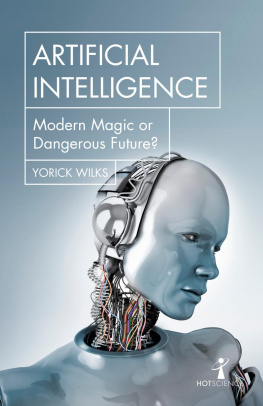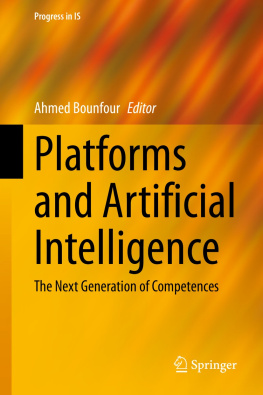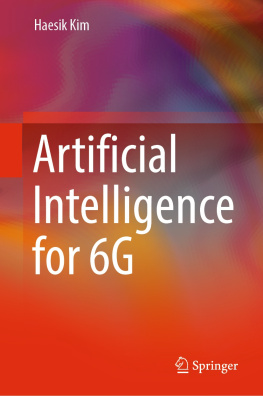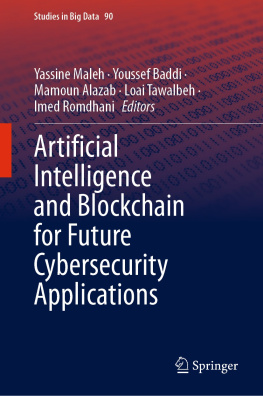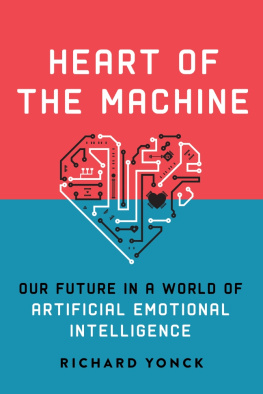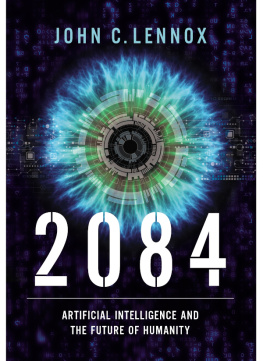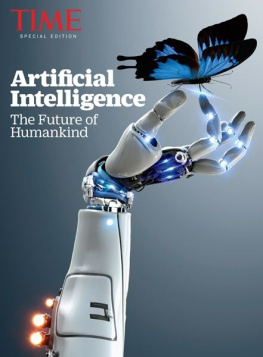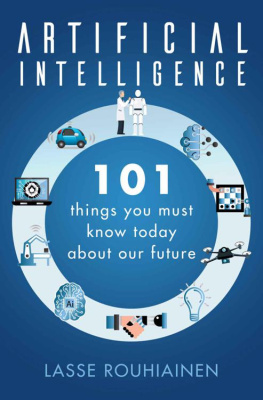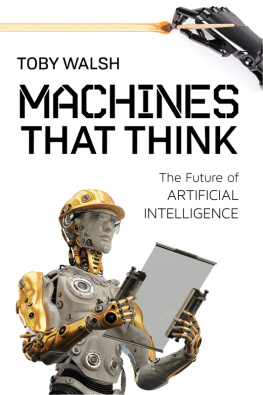Brian S. Hilbush - How Artificial Intelligence and Biotechnology Will Create the Medicines of the Future
Here you can read online Brian S. Hilbush - How Artificial Intelligence and Biotechnology Will Create the Medicines of the Future full text of the book (entire story) in english for free. Download pdf and epub, get meaning, cover and reviews about this ebook. year: 2021, publisher: Wiley, genre: Romance novel. Description of the work, (preface) as well as reviews are available. Best literature library LitArk.com created for fans of good reading and offers a wide selection of genres:
Romance novel
Science fiction
Adventure
Detective
Science
History
Home and family
Prose
Art
Politics
Computer
Non-fiction
Religion
Business
Children
Humor
Choose a favorite category and find really read worthwhile books. Enjoy immersion in the world of imagination, feel the emotions of the characters or learn something new for yourself, make an fascinating discovery.

- Book:How Artificial Intelligence and Biotechnology Will Create the Medicines of the Future
- Author:
- Publisher:Wiley
- Genre:
- Year:2021
- Rating:4 / 5
- Favourites:Add to favourites
- Your mark:
- 80
- 1
- 2
- 3
- 4
- 5
How Artificial Intelligence and Biotechnology Will Create the Medicines of the Future: summary, description and annotation
We offer to read an annotation, description, summary or preface (depends on what the author of the book "How Artificial Intelligence and Biotechnology Will Create the Medicines of the Future" wrote himself). If you haven't found the necessary information about the book — write in the comments, we will try to find it.
Brian S. Hilbush: author's other books
Who wrote How Artificial Intelligence and Biotechnology Will Create the Medicines of the Future? Find out the surname, the name of the author of the book and a list of all author's works by series.
How Artificial Intelligence and Biotechnology Will Create the Medicines of the Future — read online for free the complete book (whole text) full work
Below is the text of the book, divided by pages. System saving the place of the last page read, allows you to conveniently read the book "How Artificial Intelligence and Biotechnology Will Create the Medicines of the Future" online for free, without having to search again every time where you left off. Put a bookmark, and you can go to the page where you finished reading at any time.
Font size:
Interval:
Bookmark:
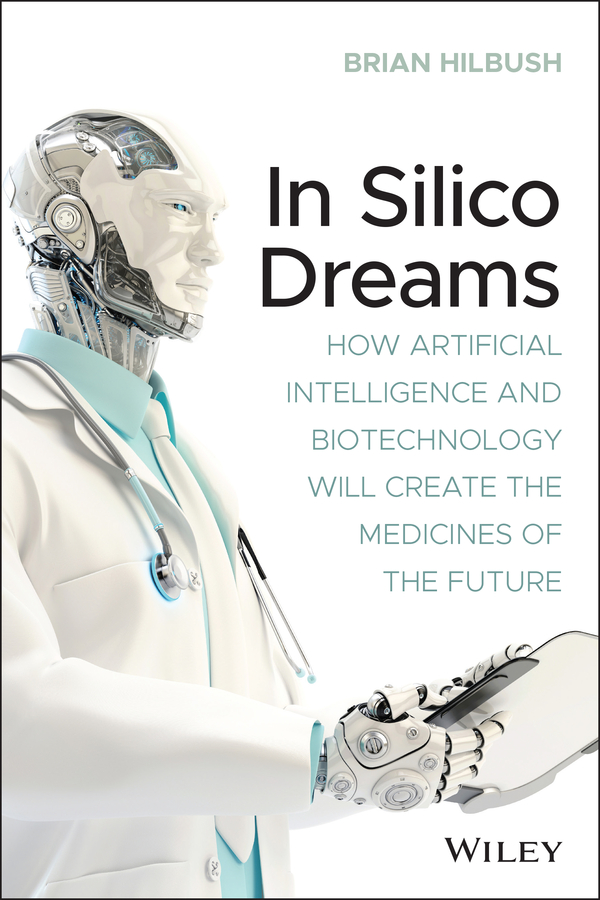
- Chapter 1
- Chapter 2
- Chapter 3
- Chapter 4
- Chapter 6
- Chapter 7
- Chapter 1
- Chapter 2
- Chapter 3
- Chapter 4
- Chapter 5
- Chapter 6
- Chapter 7
- Chapter 8
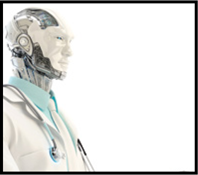
Brian Hilbush

Copyright 2021 by John Wiley & Sons, Inc. All rights reserved.
Published by John Wiley & Sons, Inc., Hoboken, New Jersey.
Published simultaneously in Canada.
ISBN: 978-1-119-74557-0
ISBN: 978-1-119-74564-8 (ebk)
ISBN: 978-1-119-74563-1 (ebk)
No part of this publication may be reproduced, stored in a retrieval system, or transmitted in any form or by any means, electronic, mechanical, photocopying, recording, scanning, or otherwise, except as permitted under Section 107 or 108 of the 1976 United States Copyright Act, without either the prior written permission of the Publisher, or authorization through payment of the appropriate per-copy fee to the Copyright Clearance Center, Inc., 222 Rosewood Drive, Danvers, MA 01923, (978) 750-8400, fax (978) 750-4470, or on the web at www.copyright.com. Requests to the Publisher for permission should be addressed to the Permissions Department, John Wiley & Sons, Inc., 111 River Street, Hoboken, NJ 07030, (201) 748-6011, fax (201) 748-6008, or online at http://www.wiley.com/go/permission.
Limit of Liability/Disclaimer of Warranty: While the publisher and author have used their best efforts in preparing this book, they make no representations or warranties with respect to the accuracy or completeness of the contents of this book and specifically disclaim any implied warranties of merchantability or fitness for a particular purpose. No warranty may be created or extended by sales representatives or written sales materials. The advice and strategies contained herein may not be suitable for your situation. You should consult with a professional where appropriate. Neither the publisher nor author shall be liable for any loss of profit or any other commercial damages, including but not limited to special, incidental, consequential, or other damages.
For general information on our other products and services or for technical support, please contact our Customer Care Department within the United States at (800) 762-2974, outside the United States at (317) 572-3993 or fax (317) 572-4002.
Wiley also publishes its books in a variety of electronic formats. Some content that appears in print may not be available in electronic formats. For more information about Wiley products, visit our web site at www.wiley.com.
Library of Congress Control Number: 2021941419
Trademarks: WILEY and the Wiley logo are trademarks or registered trademarks of John Wiley & Sons, Inc. and/or its affiliates, in the United States and other countries, and may not be used without written permission. All other trademarks are the property of their respective owners. John Wiley & Sons, Inc. is not associated with any product or vendor mentioned in this book.
Cover Image: Vladyslav Otsiatsia/Getty Images
Cover Design: Wiley
Brian Hilbush is a biotechnology and genomics expert with three decades of executive-level business and scientific management experience in the life sciences. Brian has worked at Fortune 500 companies, consulted for the pharmaceutical and semiconductor sectors, and commercialized technology platforms in genomics. Brian co-founded ModGene, where he built a genetics-based drug target discovery platform with a focus on neurodegenerative diseases. His technical expertise resides at the intersection of genomics, artificial intelligence, and bioinformatics. Brian has led technical teams developing software and analytics pipelines for human genomics studies, neuroanatomy, and gene expression. He has co-authored numerous scientific publications and was co-inventor on patents for novel treatments of Alzheimer's disease. Brian received his BS in cell and molecular biology from the University of Washington and his PhD in neuroscience from Stony Brook University in 1991. For more information on this book, please visit insilicodreams.com.
Ted Coombs is a polymath futurist, technologist, and author of 24 technology books. His career in tech started in the 1970s as a laser engineer and roboticist. He began working in AI in 1983 for the Cleveland Clinic. He is one of the founders of modern computer forensics and today is also known for his knowledge of AIOps and DataOps. Ted is also an accomplished musician and fine artist.
This book was written entirely during the period spanning the COVID-19 pandemic. Prior to the outbreak, I discussed ideas for a book with Kenyon Brown, senior content acquisitions editor at Wiley, who provided suggestions on topics and content flow. It was out of these discussions that In Silico Dreams was formed; I thank Ken for his input at inception and guidance along the way. I also thank Gary Schwartz for expert editing and contributions to the flow of the book and to Ted Coombs for technical review and suggestions. I am also appreciative of the support of Christine O'Connor, managing editor; Saravanan Dakshinamurthy, Rachel Fogelberg, and the production staff; and Michael Trent for developing the cover design.
I gratefully acknowledge discussions, exchanges, and other communications that I had with individuals whose works and quotes are contained herein, including David Van Essen, Dan Felleman, Tushar Pandey, Philippe Schwabe, and Michael Wu for permission to use original figures, Emmanuelle Charpentier for clarifications on the potential of CRISPR technology, and many others in the STEM communities.
My intention in writing this book was to capture for the reader the intense pace of research and innovation occurring across many disciplines that are converging to impact medicine's future. Because of the enormous volume of work that has transpired over the past decade in artificial intelligence and biotechnology, it was impossible to cover all significant advances. I apologize for those omissions and for any errors in interpretation of technologies and research findings that I did cover as part of this project.
My personal journey inspired thoughts on many pages of this book. My meanderings across the once-separate fields of neuroscience, molecular biology, and computer science began in earnest while I was a freshman at the University of Washington in Seattle. I thank Donna Simmons for opening the door to neuroscience with a stint in her histology laboratory; Vijay Sarthy for allowing me to explore retinal neurochemistry and molecular biology in his research group; and Joel Levine for his patience and mentorship while I was a doctoral candidate in his lab, along with Simon Halegoua and many others at Stony Brook University. My first foray into industry was with James Morgan at the Roche Institute of Molecular Biology, a part of the pharmaceutical giant Hoffmann-La Roche in Nutley, New Jersey. I thank Jim for allowing me to plunge headlong into molecular biology.
Next pageFont size:
Interval:
Bookmark:
Similar books «How Artificial Intelligence and Biotechnology Will Create the Medicines of the Future»
Look at similar books to How Artificial Intelligence and Biotechnology Will Create the Medicines of the Future. We have selected literature similar in name and meaning in the hope of providing readers with more options to find new, interesting, not yet read works.
Discussion, reviews of the book How Artificial Intelligence and Biotechnology Will Create the Medicines of the Future and just readers' own opinions. Leave your comments, write what you think about the work, its meaning or the main characters. Specify what exactly you liked and what you didn't like, and why you think so.

